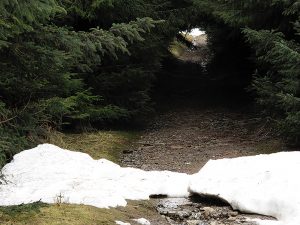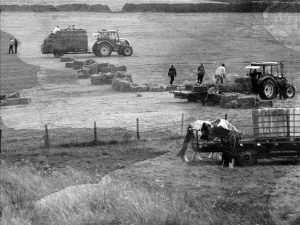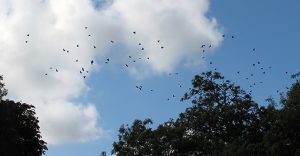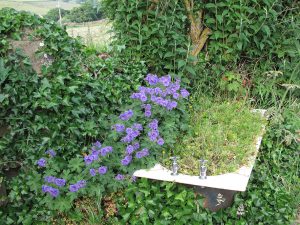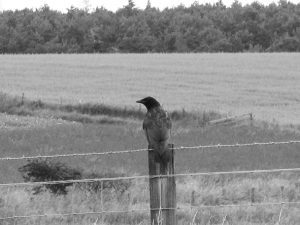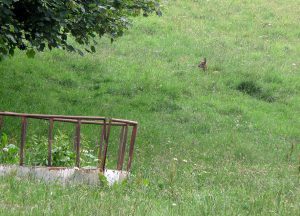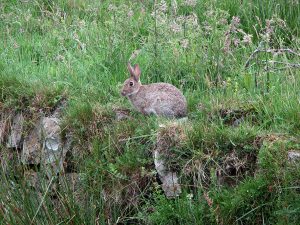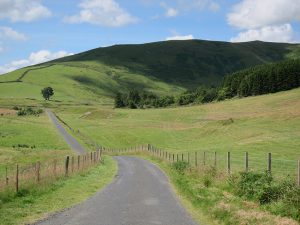Plantation, late winter (sketch)
Only now the thaw’s well advanced can I allow myself to remember that mid-winter walk.
The plantation track, March 2004.
I climbed the last length of the hill road and arrived at the short stretch of road that runs under the southern lea of the plantation, my lungs seemingly full of ice. Until I reached the lea there was only the driving snow and the road beneath my feet. Everything else was invisible. Then suddenly there were a series of dramatic aural discontinuities and transformations that meant I almost stopped looking where I was going. My resistance to the wind’s hold on my inner ear was disrupted by an acute silence that cuts off sound like the blow of an axe. In that momentary vacuum, before the sound of the wind, my footfalls and breathing returned, I knew just how punched out by the unrelenting wind my hearing had become. I stepped into the relative shelter of a big Sitka spruce, becoming part of the dramatic monochromatic patterning of trunk, branch, and snow as a momentary shift in the cloud bathed everything in bright sunlight. All around the tree tops still roared, a shaking, raging sea. Then the cloud closed in again and the light vanished.
Foolishly, I allowed the tracks of a hare to lure me off the road and into a broken, snow-covered clearing between the little self-seeded trees that fringe the entrance to the plantation and the wood itself. I followed the increasingly hesitant tracks despite sensing that my body had been losing heat since I had broken the steady rhythm of my walking. The tracks disappeared as suddenly as they had started. A mystery, deep among the sheltering trees, where the air was somehow still and crystalline, despite the wind roaring above. The flare of light off snow had undone the usual look of things, a brief ecstatic moment of disorientation that quickly turned to fear. What I believed was the beginning of the path that would lead me out to the road was in fact a narrowing cul-de-sac. I also knew that I was dangerously cold, and, retracing my steps, I left the trees’ siren shelter for the road. Somewhere in the wind’s orchestration I detected notes of mocking laughter.
I lost the high hill’s fearful soundscape as soon as I turned onto the bridle path back down towards the valley. Part-sheltered by the drystone wall from the driven snow, I could see the track’s uneven surface cross cut with long ruts that regularly expanded into half-frozen pools running almost wall-to-wall. Jumping from stone to sodden tuft to mud bank failed to carry me forward fast enough to restore my body heat. I took to scrambling along the wall’s protruding lower stones to avoid the chill and the chance of my boots filling with icy water. My feet and legs ached.
I lost the fear that came with the fading of the hare’s tracks when my attention contracted against the wind chill and I focused on maintaining momentum for warmth, allowing my feet to find their own way. My momentum was only broken twice. When a four-wheel bike passed me, the driver seemingly unaware of my presence, and left the sourness of diesel in the air long after its snarl was lost to the wind. The second time, when a cock pheasant exploded into the air from under my feet.
Only at track’s end could I look up and around again, allow the larger soundscape to flood back in.
Patternings
After Sarah collected me from the Borders General Hospitalafter my first discharge, I re-read Carol Ann Duffy’s poem ‘Out of Exile’? If you don’t know it, it takes as a starting-point a drive through the Borders towns. I’ve always responded to its honesty and the range of our experiences it acknowledges; to its ‘shadow foxes running in the sky’and her recognition of our ‘inventing things as they might have been’. Perhaps remembering my own experience of being a child at the door, ‘with bags and coats, telling stories, laughing, coming home.’ I badly needed to assure myself that I wasn’t doing what she warns against in my writing; simply inventing things as they might have been. But, of course, that assurance is impossible. I can only continue as best I can, keeping my ears and eyes open.
My first clear memory of being here in the valley is of going with Kate, Hamish, Mike, and Cat one Saturday in late July to find the others, who were helping with the hay at the Grahams’. I felt very shy because they all knew what to do and I didn’t. I was even frightened of riding on top of the bales, something I loved doing later. Dot Graham made space for me in the tractor cab next to one-eyed Meg and asked me to watch for cars at the gates. It was my first experience of a now familiar smell: that mix of diesel, dung, oil, old dog, hay, rubber boots, and sweat. I became happy just as soon as I felt necessary, and perhaps it was then that I started to absorb lessons about the relationship between shared work and community.
I know I had meet and spoken with Mrs Purvis the day before, as she was ending one of her particularly nasty exchanges with poor Anthony at the post office. But the less said about it the better, since it earned me her undying disapproval. I must have blocked it out of my memory almost as soon as it happened. I was still recovering from it that Saturday. It makes me shudder even now.
I woke up on another Saturday, about four months later during that first year, just knowing something had changed in the night. I’m now so familiar with the muffling of sound and change of light from sudden overnight snowfalls that I take them for granted. But that first time I was transported. I looked out over the snowcovered fields from the end of my bed, wrapped in bedcloths and my old quilt, knowing that to watch, from a warm bedroom, that vast white world coming to life in the morning light was to know I was both safe and loved. I could happily have sat there all day but if I hadn’t needed to pee.
When to face the cold and pee was a constant preoccupation on winter mornings. I always put off leaving my bed until the very last moment and then, desparate, jumped up, shoved my feet into woolly slippers, and rushed next door. (If it was really cold I wore my socks in bed and skipped the slippers). Knowing Dad would be downstairs I didn’t bother with the door, slid over the linolium, pulled down my pajamas and squatted just above the icy plastic seat. The sight of our old linolium still brings back a sense of that intense relief and the oddly sweet smell of my own urine.
My bladder empty, I would run the hot tap and have a ‘quick lick’ – how quick depended on the temperature. Then a dash back to my room to struggle into whatever clothes came to hand, while exposing as little of myself as possible to the air. Dressed, I’d drag a brush through my hair, find a hair band, shove my feet into shoes and, without lacing them up, clatter down the stairs into the kitchen.
I remember some things so vividly, yet much of my childhood hovers at the edge of memory like the faint smell of Dad’s liver, bacon and onions in the kitchen curtains. That elusiveness disconcerts me, particularly when I can’t place an event. It leaves me uneasy, although why I don’t exactly know.
I fell in love with the rooks and their attendent jackdaws simply by looking out of my bedroom window that autumn. I would gradually become fascinated by all the birds, but they were my favourates. I particularly liked those that lived by the water; the busy dippers, mallard, and pied wagtails that swam and hunted along our stretch of riverside, and the tall gray herons that rose ghostly silent through the morning mist if disturbed. But above all I loved the rooks. Morning after morning I would watch their ragged emiscaries cross from the rookery behind the graveyard and fly their sorties out across the fields. I loved both their noisy gegariousness, their tattered black forms buffeted by winds that, in winter, carried long plumes of dry powdery snow up off the tops of the dry-stone walls and towards them high into the air. I’d even risk the cold to open my curtains in anticipation of their arrival and, while I waited, listen to the house waking up.
First the floorboards would creak gently as the electric booster warmed the pipes, then the various noises that meant Dad was up and, before long, would be in the bathroom. But before that happened the first rooks would already be in the air.
It’s possible that my fascination with following the rooks’ regular voyaging while in the bath somehow led to my becoming fascinated with the idea of baths as boats, of a bath/boat/bodily little voyaging world all of its own. One that could at a pinch be shared with another body, as when I would occasionally share a bath with Cat, but essentially a solitary warm space in which to voyage whereever I wished in imagination. Or, of course, a boat/coffin, a possibility that only came to me after we did the vikings at school. Because of that childhood fascination I’ve always kept an eye out for re-cycled baths, particually those that hint at viking ship burials.
Summer holiday mornings were, of course, quite different from winter ones. I’d be up very early and into the day, usually without bothering to dress. Dad would come downstairs to find me sprawling on the big hooky-proddy rug, either reading or drawing and still in my nightie with, as he’d say, my ‘thin bits’ sticking out in all directions. (In winter I wore thick striped boy’s pygamas and sometimes kept my vest, pants and socks on for extra warmth, particularly during weeks when condensation left wonderful patternings of ice seemingly etched into the inside of the window each morning.) Not in summer, when Dad always half-heartedly protested about my lack of sense and decency.
‘Put some proper clothes on that scrawnly little hide of yours, daftie. And for goodness sake do something about that bird’s nest too.’ (Referring to my frequently uncombed hair.)
Until I reached publity we had a daily summer holiday ritual. Usually I’d jump up as soon as Dad reached the bottom stair, stick out my tongue, and scamper up past him, knowing that if I was too slow I’d get a playful smack on my bottom. But if he looked tired or worried I’d stay put and wait until he came over, before asking him for a hug. Then he’d scoop me up, hug me for a moment or two, ask how his ‘daft skinny little lass’ was and, before I could answer, give me a kiss on my cheek that always turned into a wet raspberry. Then he’d unceremoniously dump me back on the floor and send me up to dress. I liked that he could so easily lift me off the ground, his bear-like hug, his newly shaved smell, and the familiar feel of the hot wet raspberry on my cheek. So I was sad that, when I got to be ‘a young lady’ (his euphemism for puberty), he gave up on the rough and tumble closeness we’d had before. I sensed this distance was the price I paid for my little half lemon breasts and the shadow of hair starting to appear down below, which only added to my general confusion about it all.
Perhaps that’s why my pre-pubescent self and her shadowy look-alike brother still lurk among the night-people who visit me?
Poor Dad. He tried so hard with me after Mum died, in his funny, slightly gruff and sometimes absent-minded way. He took good care of me, made sure Mrs Oliver or my Aunt Claire dealt with things he didn’t feel able to, listened fairly patiently to my endless prattling and, when I was still a child, giving me the cuddles I needed whenever I asked for them. He even did his best to kept Mrs Purvis’ encroachments on my fierce sense of personal dignity to a minimum. But my reaching puberty was somehow just too much for him. As a wiry, androgynous little tomboy, my ‘girl bits’ didn’t come between us and I believe he treated me much as he would have a son, although perhaps with more tenderness. But when his little stick-insect daughter started to develop a proper bum and a chest that could no longer pass for an ironing board, not to mention all the related complications, he went into slow retreat. I think now that my changes meant I reminded him just a little too much of Mum, since Aunt Clare always said I was her spitting image. That must have made things hard for him in ways no twelve-year-old girl could possibly imagine.
Perhaps that’s why he was happy for me to spend so much time at Homehaugh. I knew deep down that he loved me just as he’s always done, but the shift in our relationship was unsettling. Sometimes when I was doing school work, drawing, or darning socks, this one of many tasks Mrs Purvis did for Dad but flatly refused to do for me,he’d stand behind me, gently kiss the top of my head, and then give my hair a playful little muss. ‘Goodness pet, you’re growing up so fast’ he’d always say, with just a hint of sadness. But, apart from that and a bedtime peck on the cheek, there was no longer the physical closeness between us there’d been before. No morning bearhugs, no more of the playful smacks on my bottom that I’d always rather enjoyed, and none of the mock fights over nothing that always ended up with him tickling me until I squealed for mercy.
I could not have begun to say that what I was missing was something physical, bodily, given that it involved Dad and my growing sense of being a girl. But it was around that time that I started having little shoving matches with Hamish. I probably needed that physical contact to get a proper sense of myself, of where I ‘stopped’ and ‘started’ as this person who was not just ‘me as I’d always been’ but, more and more, also this new person: ‘me as a young lady’. Of course I talked to Lizzy, Kate, Cat and Patsy about this, particularly Kate and Cat. But all that talk was quite different from what my body mysteriously learned from its initial tentative contact through those little push and shove holiday sessions with Hamish.
‘Love’ and other puzzles
In those days of whirlwind changes in my feelings, the non-human world was often much easier to deal with than the human one. Most people, most of the time, just tended to confuse me, even the ones I would have said I loved, like Dad.
I knew without a shadow of doubt that I loved our rooks, something I felt particularly keenly in winter and early spring when I was most aware of them. And I felt much the same about next-door’s cat, Minnie, and the stocky little black pony with one white ankle, Charlie, who I rode as often as I was allowed. I think I also knew this love was far from unconditional. The only demands the non-humans might make on me were of the simplest, most immediate, kind. The rooks, like the roe deer and rabbits, simply needed my attention, my noticing them. The rooks, of course, also needed an audience, someone to hear their numeros and varied exchanges and admire their airial gymnastics, or so I firmly belived. Minnie and Charlie needed to be stroked or patted, given immediate, physical attention which, each in their own way, they returned simply and directly. I also loved them because I could imagine something of what it must be like to be them, something I found much more difficult with adults.
Since I had regular and extraordinarily vivid dreams of flying as a child, it was simple enough to imagine feeling the wind under my sleek black wings, to imagine twisting, gliding and flapping out over the fields with my companions. It was equally easy to sense cantering round the field shaking your mane when there was too little wind to keep the flys off. (I did something very similar when the midges were bad.) Or sitting on one of the big flat stones that topped a wall warmed by the sun and methodically lick myself clean all over, as Minnie did. I used to think how I could so easily have been a rook, a small tabby cat with one broken ear, or a stocky little black pony.
Roe doe in a field near Chesters.
Rabbit on a wall, Morebattle.
Loving people was, by comparison, much more complicated. Even Dad expected me to behave in ways that had little or nothing to do with what was actually happening that moment. Instead of going on doing whatever I was doing, people always expected me to second-guess what they wanted. That usually involved breaking off some important imagining to do things I didn’t want to do. But in the late spring and early summer of the year I turned thirteen there was much to distract me from my resentment and confusion.
The whole mysterious panoply of the non-human world seemed particularly vivid and beautiful that spring. At sunrise there’d be dew-bejewelled cobwebs festooned with points of trembling light as the breeze tugged at them. These would throw the faintest dots of light onto the bathroom wallpaper with its scattering of unfeasably crimson pomegranites contained within a barely visible decorative grid. Outside there would be rabbits on the back lawn, patient ewes and their lambs with legs like pipe-cleaners, maybe a resplendent cock pheasent or, later in the year, a clutch of black cows with their sloe-eyed calves as suppliment to my usual pleasure in the rooks. This kaleidoscopic world, which tugged my senses out beyond the human, all seemed to hang together in some unfathomable way, a coherent patterning of innumerable connections. It was my attempting to share something of this that started Hamish and I on becoming more than simply friends.
Now, of course, I recognise the difficulties of this child-like, kaleidoscopic sense of love for the world, something I have to weigh in the balance against what I know of the world as a citizen. That process of weighing-up is complicated further because there’s a certain, not always wholly separable, childishness that the valley also perpetuates, or so it seems to me, something that I think keeps people like Lizzy from seeing this world straight.
But my need to engage with that balancing act was still far in the future when my little cottage bedroom was still the certain centre of an expanding world.
